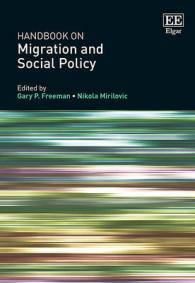- ホーム
- > 洋書
- > 英文書
- > Business / Economics
Full Description
Fueled by corruption, fraud, and organized crime, the shadow economy—also known as the informal, black market, illegal, or underground economy—is currently on the rise worldwide. Corruption, Fraud, Organized Crime, and the Shadow Economy addresses shadow economies and the players involved by examining various aspects of criminal law and prosecution.
This book gathers the insights of several world-renowned professionals and academics in order to portray the links between organized crime, the shadow economy, and corruption. It discusses how to address these issues as they relate to crime, criminal law, and prosecution of the players involved.
The constant misconception by policy makers of the relationships between organized crime, corruption, and the shadow economy fuels the present status quo of economic inequality, increases the risks of future economic crises, victimizes people, and even damages the environment. This book takes a critical, multinational, multidisciplinary, common-sense approach to complex and globalized problems of conventional and unconventional deviance through the shadow economy.
The contributors identify key critical areas in specific countries from which they originate, adding an insider's perspective to their analyses. With these insights and the use of illustrative case studies, they highlight best practices as well as mistakes to avoid in encountering the obstacles that lie ahead in combating the shadow economy.
Contents
Introduction: Relationship of the Informal Economy to Corruption, Fraud, and Organized Crime. Informal Economy and Organized Crime. Financial Flows of Organized Crime and Tax Fraud in Developed Countries: An Empirical Investigation. Organized Crime and the Mafia between Violence and Informal Economy. Informal Economy: Connection to Organized Crime, White Collar Crime, and Corruption. Insurance Industry and Informal Economy. Role of Lawyers as Defenders of White Collar Criminals. Falsified Prospect Theory in the Context of Corruption and Foreign Direct Investment. Construction "Mafia"?: Social Fraud and Organized Crime—The Austrian Perspective. Organized Crime and Informal Economy: The Austrian Perspective. Symbiosis of Politics, the Shadow Economy, Corruption, and Organized Crime in the Territory of the Western Balkans: The Case of the Republic of Serbia. The Relationship of the Shadow Economy and Corruption in China. A Change in Activities of Japanese Organized Criminal Gangs: From Conventional Illegal Activities to Erosion to a Legal Economy. Analysis Regarding the Roma Community from Romania. Hells Angels in the Shadow Economy. Discourse on Gray Economy, Corruption, and the Organized Crime in Slovenia. The Informal Economy in the United States: Size, Determinants, and Comparisons. Human Factors and Compliance: Depth-Psychological Perspective on White and Blue Collar Crimes. Conclusion and Future Perspectives.








